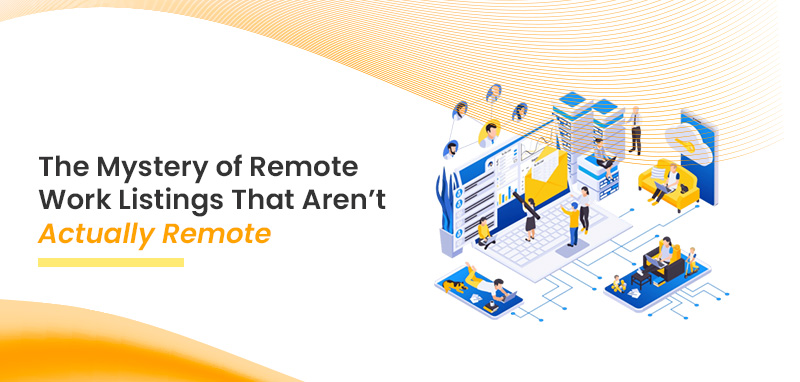The Mystery of Remote Work Listings That Aren’t Remote
Remote work has changed how we think about jobs today. It gives bosses & employees more freedom and chances to grow. The idea of working from anywhere, missing long commutes, and balancing life better pulls many folks to search for remote jobs. Still, there’s a puzzling happening: some jobs said to be remote aren’t remote at all. In this blog, we’ll look into this mystery. We’ll explore why these listings exist, how they affect people looking for jobs, and what to do about it.

The Rise of Remote WorkIn the last ten years, remote work has become super popular. Technology is better now, & people’s views on work have shifted too! The COVID-19 pandemic made everything happen faster. Companies had to let workers go remote to keep things running smoothly. Many realized that remote work brings great perks like more productivity, less office cost, & access to more talent.
Defining Remote WorkBefore diving into the mystery part, we should clarify what remote work means. True remote work means you can do your job from anywhere you want—no need to go into an office at all! This kind of work focuses on freedom and letting employees choose their perfect workspace. Remote jobs can be fully remote—no office visits—or hybrid with a mix of both.
The Emergence of Misleading ListingsEven though we know what real remote work looks like, lots of job ads claiming to be “remote” don't meet that standard. Many job seekers find positions that seem open but require going into an office or have limits based on where you live. This difference leaves many candidates feeling frustrated and confused about what's real.
The Reasons Behind Misleading ListingsWhy do these misleading ads exist? Several reasons play a part. These factors help us see what employers might be thinking & guide job seekers in their hunt.
Company Policies and Culture Some firms label their roles as remote just to catch more applicants but still follow old workplace rules. Often, they worry about teamwork or keeping the company culture alive. Because of this worry, they might want employees back in the office often—even if they say it’s remote.
Hybrid Work ModelsHybrid ways of working mix in-office and remote schedules. Some companies allow this split but still call their roles "remote". In these cases, workers might need to live close enough to the office or visit sometimes.
Geographical RestrictionsSome jobs called remote might have location limits because of legal or tax stuff. A company might only hire folks from certain states or countries so they can follow employment laws easily. These ads still say "remote," but they aren’t truly open for everyone.
Lack of Clear CommunicationSometimes confusion comes from not having enough details in job postings. Employers may not spell out the expectations well enough, leading candidates to believe they’re fully remote when they are not—a clear source of disappointment!
Changes in Business Needs Companies can change direction based on what’s happening in business. A role that was once advertised as a remote position might end up needing in-person attendance due to project shifts or client needs. This doesn’t mean they’re lying—it’s just something that happens!
The Impact on Job SeekersMisleading listings can affect those looking for jobs in many ways.
Wasted Time and EffortJob seekers put tons of time into making applications and prepping for interviews! Figuring out a role isn’t truly remote feels like a huge waste & causes unnecessary stress.
Financial and Logistical ChallengesFor some who moved or changed their lives for a promise of working from home, learning they need to go into an office often creates money issues & logistical headaches—commuting expenses & family disruptions all add stress!
Erosion of TrustFinding multiple misleading listings can make candidates distrustful toward employers and job sites overall! They may start doubting future chances that could be real—this makes applicants more hesitant than ever!
Mental and Emotional Toll
Feeling let down by these listings takes a toll on mental health too! Constant disappointments make it harder for seekers to stay motivated—they can feel burned out or anxious about changing expectations!
Navigating the Remote Work Landscape
Even if the situation looks messy with false claims about remote jobs, folks searching for these positions can take steps to make things easier:
Thoroughly Research Companies
Check out what companies say about their policies before applying! Look at reviews or comments from former employees on sites like Glassdoor for extra insight into the company culture regarding remote work.
Conclusion
The The confusion behind so many so-called "remote" jobs shows how fast our workplaces are changing today! While the growth of remote work brings loads of benefits—it also adds challenges for seekers! By knowing why ads mislead them and actively navigating this market—candidates can set themselves up better for success!
